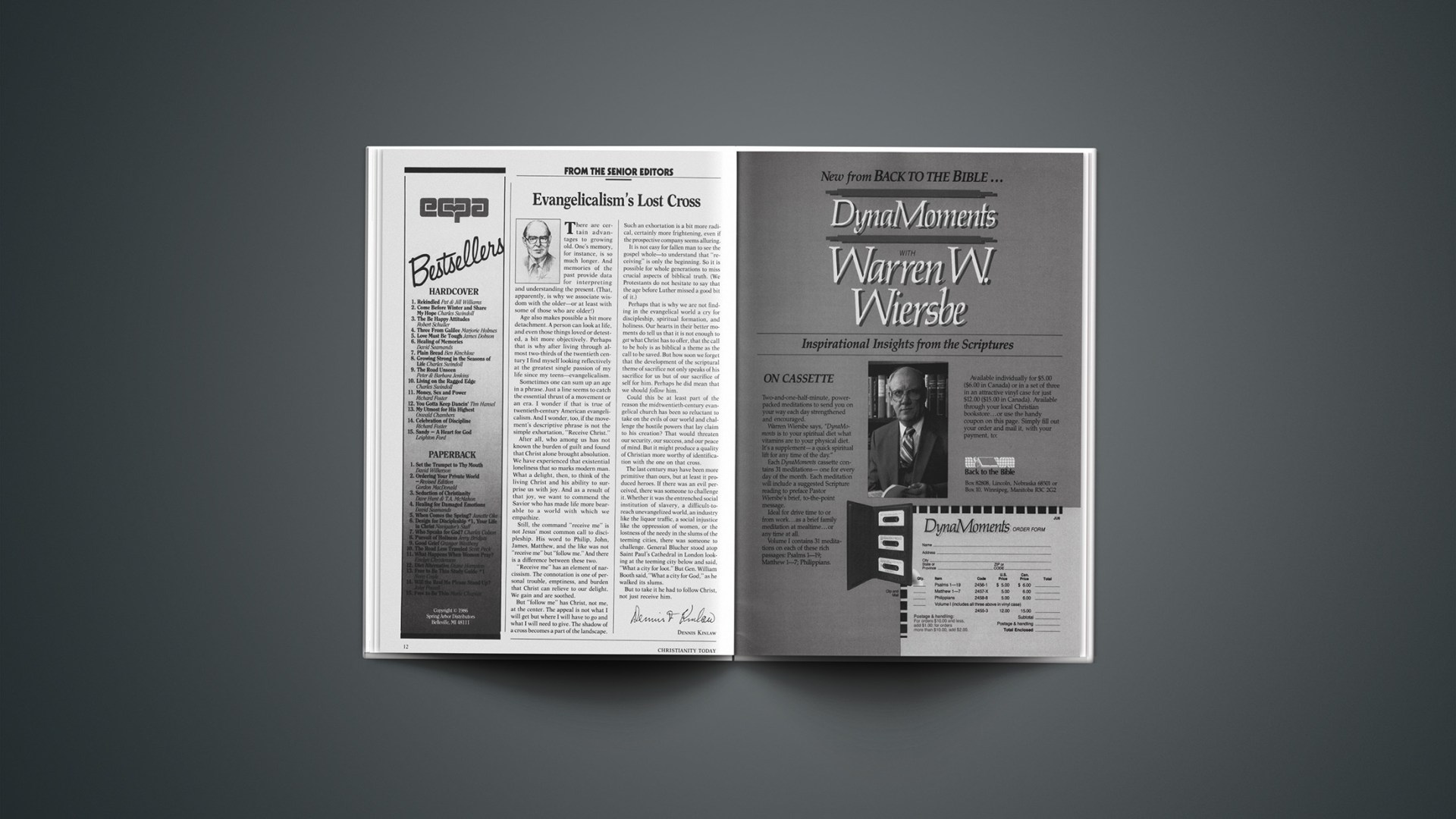There are certain advantages to growing old. One’s memory, for instance, is so much longer. And memories of the past provide data for interpreting and understanding the present. (That, apparently, is why we associate wisdom with the older—or at least with some of those who are older!)
Age also makes possible a bit more detachment. A person can look at life, and even those things loved or detested, a bit more objectively. Perhaps that is why after living through almost two-thirds of the twentieth century I find myself looking reflectively at the greatest single passion of my life since my teens—evangelicalism.
Sometimes one can sum up an age in a phrase. Just a line seems to catch the essential thrust of a movement or an era. I wonder if that is true of twentieth-century American evangelicalism. And I wonder, too, if the movement’s descriptive phrase is not the simple exhortation, “Receive Christ.”
After all, who among us has not known the burden of guilt and found that Christ alone brought absolution. We have experienced that existential loneliness that so marks modem man. What a delight, then, to think of the living Christ and his ability to surprise us with joy. And as a result of that joy, we want to commend the Savior who has made life more bearable to a world with which we empathize.
Still, the command “receive me” is not Jesus’ most common call to discipleship. His word to Philip, John, James, Matthew, and the like was not “receive me” but “follow me.” And there is a difference between these two.
“Receive me” has an element of narcissism. The connotation is one of personal trouble, emptiness, and burden that Christ can relieve to our delight. We gain and are soothed.
But “follow me” has Christ, not me, at the center. The appeal is not what I will get but where I will have to go and what I will need to give. The shadow of a cross becomes a part of the landscape. Such an exhortation is a bit more radical, certainly more frightening, even if the prospective company seems alluring.
It is not easy for fallen man to see the gospel whole—to understand that “receiving” is only the beginning. So it is possible for whole generations to miss crucial aspects of biblical truth. (We Protestants do not hesitate to say that the age before Luther missed a good bit of it.)
Perhaps that is why we are not finding in the evangelical world a cry for discipleship, spiritual formation, and holiness. Our hearts in their better moments do tell us that it is not enough to get what Christ has to offer, that the call to be holy is as biblical a theme as the call to be saved. But how soon we forget that the development of the scriptural theme of sacrifice not only speaks of his sacrifice for us but of our sacrifice of self for him. Perhaps he did mean that we should follow him.
Could this be at least part of the reason the midtwentieth-century evangelical church has been so reluctant to take on the evils of our world and challenge the hostile powers that lay claim to his creation? That would threaten our security, our success, and our peace of mind. But it might produce a quality of Christian more worthy of identification with the one on that cross.
The last century may have been more primitive than ours, but at least it produced heroes. If there was an evil perceived, there was someone to challenge it. Whether it was the entrenched social institution of slavery, a difficult-to-reach unevangelized world, an industry like the liquor traffic, a social injustice like the oppression of women, or the Iostness of the needy in the slums of the teeming cities, there was someone to challenge. General Blucher stood atop Saint Paul’s Cathedral in London looking at the teeming city below and said, “What a city for loot.” But Gen. William Booth said, “What a city for God,” as he walked its slums.
But to take it he had to follow Christ, not just receive him.










